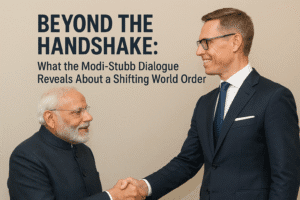Beyond the Handshake: What the Modi-Stubb Dialogue Reveals About a Shifting World Order
The recent dialogue between PM Modi and Finland’s President Stubb transcended routine diplomacy, revealing a significant shift in global dynamics. Their discussion underscored India’s emergence as a critical “bridge” nation, whose respected voice is now deemed essential for resolving distant conflicts like the war in Ukraine. Beyond geopolitics, the conversation highlighted a strategic push to deepen the India-EU partnership, moving past traditional trade into co-developing the foundational technologies of tomorrow.
The commitment to collaborate on quantum computing, AI, and 6G marks a long-term vision to build economic and digital resilience together. Ultimately, this meeting illustrates how modern alliances are forged not just on political agreement, but on shared technological innovation and a mutual recognition that global challenges require truly inclusive solutions.

Beyond the Handshake: What the Modi-Stubb Dialogue Reveals About a Shifting World Order
When Finnish President Alexander Stubb and Indian Prime Minister Narendra Modi connected this week, the surface-level readout was familiar: two leaders discussed Ukraine and bolstered trade ties. But to dismiss it as routine diplomacy would be to miss the deeper, more significant story unfolding. This conversation was a microcosm of a new global reality—one where middle powers like India are becoming indispensable brokers, and where technology and trade are the new currencies of geopolitical influence.
The Strategic Subtext of the Conversation
At first glance, the discussion covered two main tracks:
- The Path to Peace in Ukraine: President Stubb explicitly acknowledged India’s unique position, stating it is “heard and respected in the South, West, and East.” This is more than mere flattery. It’s a recognition from a key Western-aligned leader that resolving a European conflict now requires voices from outside the traditional transatlantic alliance. India’s historical, though now strained, relationship with Russia and its massive global stature gives it a channel of communication that many Western nations lack. PM Modi’s reaffirmation of a “peaceful resolution” aligns with India’s consistent call for dialogue and diplomacy, a stance that is increasingly seen not as neutrality but as necessary pragmatism.
- India-EU: A Partnership of Necessity: While PM Modi rightly called Finland a “valued partner,” Helsinki also serves as a gateway and a persuasive voice for India within the European Union. Both leaders stressed the need to “further deepen” India-EU relations. In a world of re-shoring supply chains and economic uncertainty, the EU seeks reliable, democratic partners, and India represents a massive alternative market and a fellow democratic counterweight. For India, deeper ties with the EU mean access to cutting-edge technology, investment, and validation as a leading global power.
The Real Foundation: Collaboration in Tomorrow’s Technologies
The most forward-looking part of the discussion wasn’t about geopolitics, but about technology. The commitment to boost cooperation in quantum computing, 6G, AI, and cybersecurity is where the true long-term partnership is being built.
- Why it Matters: These aren’t just buzzwords. They are the foundational technologies that will define economic and military dominance in the 21st century. Finland, home to Nokia and a renowned innovation ecosystem, is a natural partner for India’s own tech powerhouse ambitions.
- A Shared Goal: Collaboration here moves the relationship beyond simple trade in goods to co-creating the standards and systems of the future. By working together, they can ensure a more diversified and secure global tech landscape, reducing over-reliance on any single region.
The Human Insight: What This Tells Us About Global Diplomacy Today
- The Rise of the “Bridge” Nation: The effusive praise for India’s global role is a strategic necessity. The West understands that complex global problems—from climate change to regional conflicts—require buy-in from the Global South. India, with its leadership of the G20 and the Global South, is perhaps the most critical bridge to achieving that consensus.
- Trade and Tech are Inextricably Linked to Security: The dialogue seamlessly wove together peace in Ukraine with cooperation in AI. This reflects a modern truth: economic security is national security. A nation’s resilience is now measured by its control over critical tech, data flows, and energy resources, not just its military might.
- Finland’s Strategic Pivot: Following its entry into NATO, Finland is actively leveraging its new position and its EU membership to build strategic partnerships beyond its immediate neighborhood. Engaging with India is a savvy move to diversify its diplomatic and economic portfolio for a more contested world.
The Modi-Stubb conversation was significant not for any immediate, breakthrough announcement, but for what it signifies: a deliberate and strategic weaving together of India and Europe’s futures. It acknowledges that the road to peace in Ukraine may run through diplomatic channels in New Delhi as much as those in Brussels or Washington. And it confirms that the alliances of tomorrow will be built just as much in research labs working on quantum algorithms as in diplomatic halls discussing peace treaties.
In essence, this was a meeting about building a stable, multi-aligned world order—one technological partnership and one diplomatic dialogue at a time.
You must be logged in to post a comment.